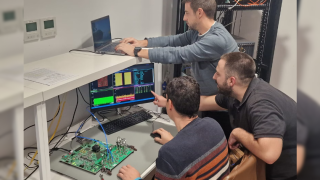My opportunity to enter the data centre industry came three years ago with Colt Datacentre Services. They recruited me as their global head of strategic sourcing and supplier relationship management. Subsequently, last year, I moved to Vantage Data Centers as director of procurement and supply chain, EMEA.
The data centre industry has certainly brought a sense of ‘déjà vu’ for me. Perhaps that’s not so surprising: I was no stranger to working in somewhat similar traditionally male-oriented working environments. I’m also Egyptian-born and a working mother. So, all things considered, I was already all too aware of the potential obstacles and ‘glass ceilings’ that can crop up in the path of professional career progression for women across the board, including ethnic minority groups.
I have also learned more than a thing or two about how to deal with such day-to-day and longer-term challenges. After all, most of my 17-year career has been spent in the construction engineering sector, working on the commercial and procurement aspects of major railway projects. Initially, I joined construction giant Bechtel on a graduate scheme in London, before moving to Network Rail and then TfL where I was commercial and procurement manager.
Becoming an engineer and being involved in construction was something I had wanted to do from an early age. My father was a civil engineer and ran a successful construction engineering firm. My own engineering career path began with me earning a Bachelor of Science in construction engineering and management with a minor in business administration at American University in Cairo. Then, rather than join my father’s business, I wanted to plough my own furrow and so I came to the UK to earn a Master of Science in project management in construction from Brighton University.
The transfer of practical knowledge and experience, and the importance of sharing these experiences and ideas on a regular basis, is what inspires me to serve as a mentor for young female professionals looking to grow their careers within the construction and procurement industries.
For example, at Vantage, as well as my ‘day job’ of being responsible for European procurement and the supply chain – overseeing procurement for designers, construction and engineering – I am a member of the company’s Women Leadership Forum and the Justice, Equity, Diversity and Inclusivity Council (JEDI). The former enables me to network with senior managers and executives across STEM, with the primary aim of encouraging more female applicants into following STEM roles and advancing their career progression in the data centre industry. We are also looking at visiting secondary schools to talk to female students about the genuine opportunities and exciting career possibilities open to them if they pursue STEM subjects at GCSE and into further and higher education.
At the same time, the JEDI Council helps foster a spirit of belonging across the company. Every month, for example, council members share their past experiences – and how this has helped shape who they are today – in an open forum. Talking about our differences encourages Vantage to become a more diverse and inclusive workplace, build more confidence and motivation, and help the company identify future opportunities for training, promotion and progression from within the organisation. Open lines of employee communication are essential in a rapidly expanding global company such as ours, where employee diversity and inclusivity are at its core.
With the right qualifications, tenacity and ambition, combined with more active engagement and support from employers, things can change for women and ethnic groups looking for careers in engineering, supply chain and procurement as well as other roles.
When I applied and won a place more than 15 years ago on my initial construction engineering graduate placement scheme, I was the only female out of several hundred applicants. One and a half decades later, I was pleased to be sitting in a management meeting in which seven of the eight participants were women. That’s progress.
I am now passionate about helping deliver similar change in the data centre industry. Yes, today it is still overtly male-oriented. But in such a rapidly growing industry like ours, and one so essential to the digital economy, it is now more vital than ever to attract talent and enable greater opportunities for people from all walks of life. Particularly young women, working mothers and ethnic minorities.





